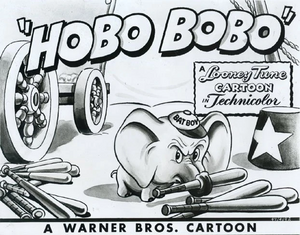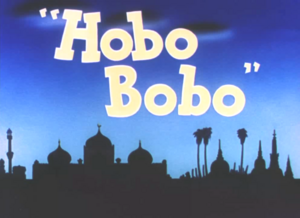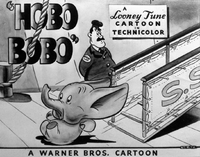Hobo Bobo
From Looney Tunes Wiki
Jump to navigationJump to search
| Hobo Bobo | |
|---|---|
 Lobby card. | |
| Production company | Warner Bros. Cartoons |
| Distributor | Warner Bros. Pictures The Vitaphone Corporation |
| Release date | May 17, 1947 |
| Starring | Robert C. Bruce Stan Freberg |
| Producer(s) | Edward Selzer |
| Music composition | Carl W. Stalling |
| Story | Warren Foster |
| Animation | Charles McKimson I. Ellis John Carey Manny Gould |
| Director(s) | Robert McKimson |
| Series navigation | |
| ← Previous | Next → |
| Title card | |

| |
Hobo Bobo is the two hundred and eighty-third Merrie Melodies theatrical short. It was distributed by Warner Bros. Pictures and The Vitaphone Corporation on May 17, 1947. It was written by Warren Foster, produced by Edward Selzer, and directed by Robert McKimson.
The story of Bobo the elephant is unveiled when he emigrates from India to America, where he hopes to play on a professional circus-themed baseball team.
Detailed summary
Memorable quotes
Bobo: Bat boy, schmat boy, I'm still carryin' logs!
Characters
In order of appearance: | ||||||||||
| ||||||||||
Locations
Objects
- Logs
- Pink paint
- Baseball bats
Vehicles
- Steamboat
- Street cleaner
- Police paddy wagon
Production

Development
Music
The music was composed by Carl W. Stalling.
Crew credits
- Layouts: Cornett Wood
- Backgrounds: Richard H. Thomas
Release
Dates are in order of release:
- United States: May 17, 1947
Behind the scenes
- This cartoon shares several similarities to Walt Disney's animated feature film, Dumbo (1941):
- Both star a grey baby elephant protagonist that is usually mute.
- Both at least involve a circus as the major location.
- Both have a scene which involves the idea of pink elephants as the hallucination of drunkenness, though in Hobo Bobo, this pink elephant idea is instead used as a joke.
- Both main characters interact with little black birds who ultimately help resolve their conflict.
- It is the only cartoon from the golden age of American animation featuring the Minah Bird that is not directed by Chuck Jones. It is also the Minah Bird's only appearance in a Robert McKimson-directed cartoon, and the only cartoon where he does not appear with Inki.
- This cartoon is one of the few past 1946 to not list any voice characterizations, as Mel Blanc did not provide any voices and his contract explicitly only allowed him to be credited for voice characterizations.
- This was Rod Scribner's last cartoon as an animator before he suffered a severe bout of tuberculosis. His name did not appear in the credits again until Strife With Father in 1950.
Errors
- While this cartoon was originally part of the Merrie Melodies series, the lobby cards erroneously calls it as a Looney Tunes cartoon; presumably it was originally planned to be part of that series, but was changed at the last minute (and the lobby cards were never withdrawn).
- During the cartoon, a lady's pair of high heel slippers overlap with her feet.
Legacy
- Bobo the Elephant would return in the 1954 Looney Tunes cartoon Gone Batty, though he would not speak in that cartoon, making the former short the only one where Bobo actually spoke.